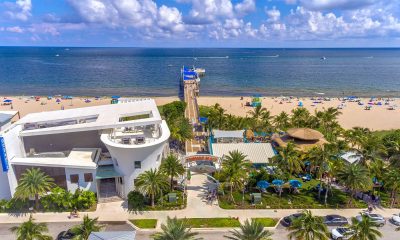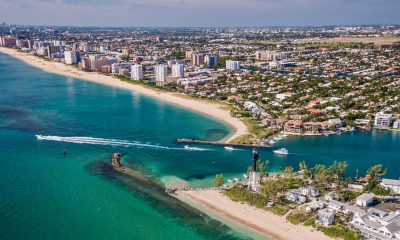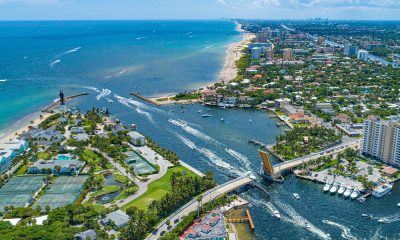South Florida Local News
Broward County leader urges against disparaging billionaires amid New York mayoral candidate’s remarks

Broward County, Florida – The debate over the existence of billionaires has resurfaced following recent comments by Zohran Mamdani, a socialist democratic candidate for mayor of New York City. Mamdani, in a candid network news interview, boldly stated, “I don’t think that we should have billionaires because, frankly, it is so much money in a moment of such inequality.” His remark has ignited a wave of reactions, especially in South Florida, where political and economic leaders are quick to highlight the region’s business-friendly climate and growing appeal to corporate relocations.
Mamdani’s comments, although reflective of his campaign’s ideology, have raised concerns among some in South Florida, particularly those in economic development circles. They worry that a tone that dismisses the role of billionaires and large corporations could further fuel a corporate migration movement to the Sunshine State. After all, Florida has long been known for its low taxes, business-friendly policies, and overall economic flexibility — factors that have attracted several businesses, especially from the high-tax regions of New York, New Jersey, and Connecticut.
The state’s appeal to billionaires and large corporations has been evident in the wake of the COVID-19 pandemic. As cities like New York became epicenters of the virus, many high-net-worth individuals and corporations looked for new places to operate with fewer restrictions and a more favorable tax environment. According to Forbes’ 2025 billionaires list, New York is home to the largest number of billionaires, with 123 individuals, while both Palm Beach and Miami-Dade counties each claim 23 billionaires, and Broward County has four.
Read also: Automotive digital marketing company accelerates expansion with UKG Ready suite integration
Bob Swindell, CEO and president of the Greater Fort Lauderdale Alliance, noted that this shift in business dynamics isn’t just happening in the top two Florida counties but also includes Broward County, a region that has quietly positioned itself as an emerging business hub. “We’ll have to have more direct flights from New York to Fort Lauderdale,” Swindell said, pointing to the region’s growing appeal. He stressed that Greater Fort Lauderdale is increasingly seen as the next frontier for business expansion, offering a blend of business-friendly policies and a vibrant lifestyle. “Greater Fort Lauderdale is the new frontier for business expansion, with all the right elements to prosper both in business and in life,” he added.
Swindell also highlighted the significant efforts made by the Greater Fort Lauderdale Alliance to help businesses relocate and thrive in the area. “We’ve helped countless business leaders seamlessly relocate and expand in Broward,” he noted. “And the majority have only one regret: that they didn’t do it sooner.” This sentiment is a common refrain among business leaders who’ve made the move from high-tax, high-regulation states like New York and California. For many of them, the lower tax burden and more relaxed regulatory environment in Florida have been key motivators in their decision to relocate.
The rise in relocations isn’t just confined to the business sector. In Boca Raton, Mayor Scott Singer recently gained national attention when he told the New York Post that his city’s doors are wide open for businesses that are tired of New York’s high taxes. “New York is not going to be the capital of capitalism anymore,” Singer declared. His comments are part of a broader effort to draw attention to South Florida’s appeal as a new center of economic activity and entrepreneurship.
The Greater Fort Lauderdale Alliance, which has also seen success in attracting corporate relocations, recently sent a delegation to New York to meet with various corporate executives. This visit was part of an ongoing effort to remind businesses of the opportunities available in South Florida. “The way policymakers position themselves and the stances they take… the whole tenor of their conversation helps people form their impressions,” Swindell noted, emphasizing the importance of a region’s economic and political environment in attracting business.
While Mamdani’s remarks may have been made with New York’s economic conditions in mind, they haven’t gone unnoticed in South Florida. His position that billionaires “shouldn’t exist” has been met with skepticism by many in the region, including Swindell, who described the sentiment as “short-sighted.” Swindell pointed out that billionaires have long played a vital role in South Florida’s economy, contributing not just financially but also in terms of philanthropic efforts that have enriched the community. “They have been so incredibly generous to this community,” Swindell said, citing notable figures such as Vinnie Viola, owner of the Florida Panthers, and the family of Jim Moran, the late auto dealership magnate. The late H. Wayne Huizenga, founder of AutoNation and former owner of the Florida Marlins and Miami Dolphins, was another example of a billionaire whose legacy helped shape the region’s economic landscape.
In addition to their philanthropic efforts, many of South Florida’s wealthiest individuals have been instrumental in creating jobs, boosting the local economy, and increasing the region’s global competitiveness. Bob Venero, CEO of Future Tech Enterprise Inc., is one such example. Venero moved his company from Long Island, New York, to downtown Fort Lauderdale nearly four years ago, largely due to the region’s favorable business environment. Reflecting on the move, he noted that in New York, “they did not believe in the trickle-down effect,” where profitable businesses generate broader economic benefits for the community. In Florida, however, he has experienced a different dynamic. “Everybody I have met from a business perspective — it’s not combative,” he said. “It’s the opposite: ‘Show us your value, and when we see your value, we’ll do business.’”
Venero’s company, Future Tech, has flourished in Fort Lauderdale, doubling in size and now occupying multiple floors of the Broward Financial Center. The company regularly hosts customers from around the country, with many scheduling visits specifically during the winter months to escape colder northern climates. The move has proven to be a win-win, both for the company and for the city of Fort Lauderdale, which continues to benefit from the economic ripple effects of such relocations.
While the debate over billionaires and their place in society rages on, it’s clear that South Florida is positioning itself as a new economic powerhouse. The region’s business-friendly environment, coupled with its lifestyle advantages and philanthropic culture, makes it an attractive destination for corporations and high-net-worth individuals alike. As Swindell aptly put it, “There is no question about who we are or where we are.” The region’s economic success story is a testament to the power of a favorable business climate, one that continues to lure businesses, create jobs, and drive innovation.
As the conversation surrounding billionaires, taxation, and economic fairness continues, South Florida stands as a powerful counterpoint — a region that has embraced wealth and used it to fuel growth and opportunity for all. In the end, it’s not just about the money; it’s about how that wealth is used to build a thriving, sustainable community. And for many in South Florida, that’s a narrative they are more than happy to champion.

-

 Community11 months ago
Community11 months agoPompano Beach Pier: A coastal gem in South Florida
-

 Community11 months ago
Community11 months agoPompano Beach cost of living: Housing costs, gas prices, and required income
-

 Community11 months ago
Community11 months agoDiscover the best of Pompano Beach, Florida: A comprehensive guide to the most popular places to visit
-

 Community11 months ago
Community11 months agoMost popular Pompano Beach marinas: Fishing, boating, and a lot of fun time














